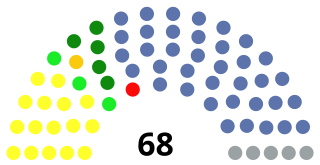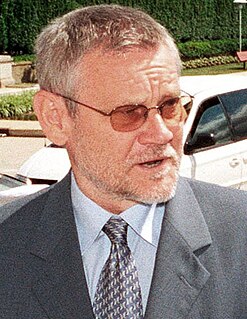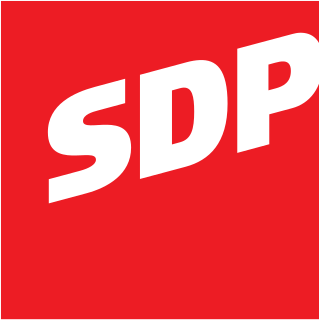
Parliamentary elections to elect all 151 members of the Croatian Parliament were held on November 23, 2003. They were the 5th parliamentary elections to take place since the first multi-party elections in 1990. Turnout was 61.7%. The result was a victory for the opposition Croatian Democratic Union party (HDZ) which won a plurality of 66 seats, but fell short of the 76 needed to form a government. HDZ chairman Ivo Sanader was named the 8th Prime Minister of Croatia on 23 December 2003, after parliament passed a confidence motion in his government cabinet, with 88 Members of Parliament voting in favor, 29 against and 14 abstaining. The ruling coalition, consisting of the Social Democratic Party (SDP), Croatian People's Party (HNS), Croatian Peasant Party (HSS), Party of Liberal Democrats (Libra) and the Liberal Party (LS) did not contest the elections as a single bloc. Namely, the SDP ran with the Istrian Democratic Assembly (IDS), the Party of Liberal Democrats (Libra) and the Liberal Party (LS), HNS ran with the Alliance of Primorje-Gorski Kotar (PGS) and the Slavonia-Baranja Croatian Party (SBHS), while HSS ran on its own.

The Croatian Parliament or the Sabor is the unicameral representative body of the citizens of the Republic of Croatia; it is Croatia's legislature. Under the terms of the Croatian Constitution, the Sabor represents the people and is vested with legislative power. The Sabor is composed of 151 members elected to a four-year term on the basis of direct, universal and equal suffrage by secret ballot. Seats are allocated according to the Croatian Parliament electoral districts: 140 members of the parliament are elected in multi-seat constituencies, 8 from the minorities and 3 from the Croatian diaspora. The Sabor is presided over by a Speaker, who is assisted by at least one deputy speaker.

The Istrian Democratic Assembly is a centre-left, regionalist, liberal political party in Croatia primarily operating in Istria County.
Regular elections in Croatia are mandated by the Constitution and legislation enacted by Parliament. The presidency, Parliament, county prefects and assemblies, city and town mayors, and city and municipal councils are all elective offices. Since 1990, five presidential elections have been held. During the same period, nine parliamentary elections were also held. In addition, there were six nationwide local elections. Croatia has held two elections to elect 11 members of the European Parliament following its accession to the EU on 1 July 2013.

The Portuguese legislative election of 2005 took place on 20 February. The election renewed all 230 members of the Assembly of the Republic.

Parliamentary elections were held alongside presidential elections in Croatia on 2 August 1992, the first after independence and under the new constitution. All 138 seats in the Chamber of Representatives were up for election. The result was a victory for the Croatian Democratic Union, which won an absolute majority of 85 seats. Voter turnout was 75.6%.

Chamber of Counties elections were held for the first time in Croatia on 7 February 1993. The result was a victory for the Croatian Democratic Union, which won 37 of the 63 elected seats.

Parliamentary elections for the Chamber of Representatives of the Croatian Parliament were held on 3 January 2000. These were the first elections to be held after the expiration of a full 4-year term of the previous Chamber of Representatives.

Parliamentary elections were held in Macedonia on 15 September 2002. The result was a victory for the Together for Macedonia, an alliance of the Social Democratic Union of Macedonia, the Liberal Democratic Party, the Democratic Party of Turks, the Democratic League of Bosniaks, the United Party of Romas in Macedonia, the Democratic Party of Serbs, the Democratic Union of Vlachs, the Workers-Peasant Party, the Socialist Christian Party of Macedonia and the Green Party of Macedonia, which won 60 of the 120 seats in the Assembly.

Constitutional Assembly elections were held in the newly independent Republic of Montenegro on 10 September 2006. Prime Minister Milo Đukanović's Coalition for a European Montenegro, at whose core was the Democratic Party of Socialists, won 39 seats in the 81 seat parliament with the vote near fully counted. The opposition blocs together received 34 seats. There were 484,430 eligible voters.

Legislative elections were held in Romania on 30 November 2008. The Democratic Liberal Party (PDL) won most seats in both the Chamber of Deputies and the Senate, although the alliance headed by the Social Democratic Party (PSD) won a fractionally higher vote share. The two parties subsequently formed a governing coalition with Emil Boc of the PDL as Prime Minister.

Parliamentary elections were held in Croatia on 25 November 2007 and for overseas voters on 24 and 25 November. The campaign officially started on 3 November. The President of Croatia announced elections on 17 October and 14 days were allowed for candidate lists to be submitted.

Parliamentary elections were held in Serbia on 21 January 2007 to elect members of the National Assembly. The first session of the new National Assembly of the Republic of Serbia was held on 14 February 2007. The elections enabled the coalition of DS; DSS & G17+ to continue.
The Left of Croatia is a marginal leftist Croatian political party with no parliamentary representation.

General elections were held in Yugoslavia on 24 September 2000. In the presidential election, official results initially showed Vojislav Koštunica of the Democratic Opposition led incumbent Slobodan Milošević of the Socialist Party of Serbia in the first round of voting, but short of the 50.01 percent needed to avoid a runoff election. However, Koštunica claimed he was not only ahead, but had finished just a few thousand votes over the threshold to win a first-round victory. Spontaneous protests broke out in support of Koštunica, and Milošević was forced to resign on 7 October and concede the presidency to Koštunica. Revised totals were subsequently released showing Koštunica had indeed won a narrow first-round victory, with just over 50.2 percent of the vote.

Parliamentary elections were held in Lithuania in two stages on 20 October and 10 November 1996. All 141 seats in the Seimas were up for election; 70 based on proportional party lists and 71 in single member constituencies. Where no candidate gained more than 50% of the vote on 20 October, a run-off was held on 10 November.

The People's Coalition was a centre-left political alliance in Croatia.

Parliamentary elections were held in Croatia on 8 November 2015. All 151 seats in the Parliament were up for election. This parliamentary election was the 8th since the first multi-party election in 1990 and the first since Croatia joined the European Union in 2013. The ruling center-left Croatia is Growing coalition, led by Prime Minister Zoran Milanović, was challenged by the center-right Patriotic Coalition led by the HDZ and headed by its party chairman Tomislav Karamarko, and also faced several new political coalitions.
General elections were held in Bosnia and Herzegovina on 18 November 1990, with a second round of voting in the House of Peoples elections on 2 December. These were the final general elections to be held in Bosnia and Herzegovina while it was still a constituent republic of the Socialist Federal Republic of Yugoslavia.


























